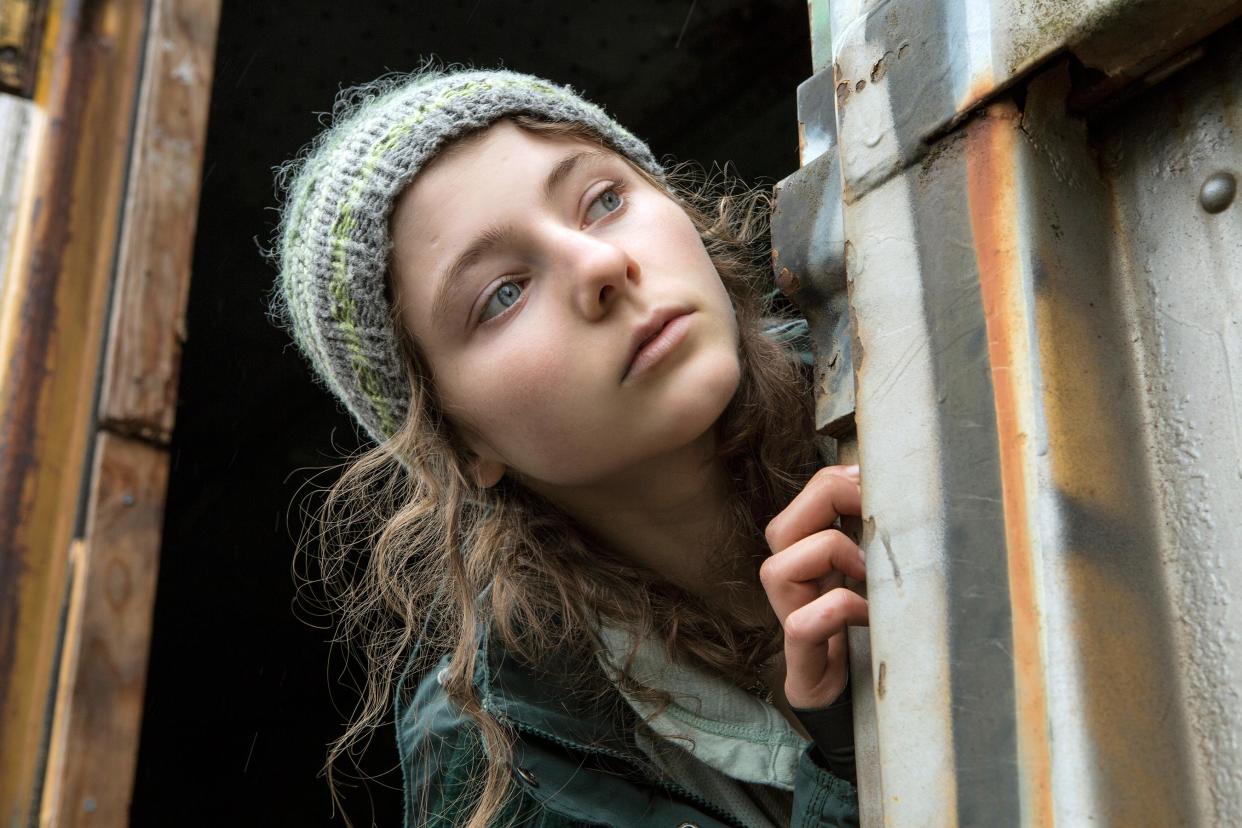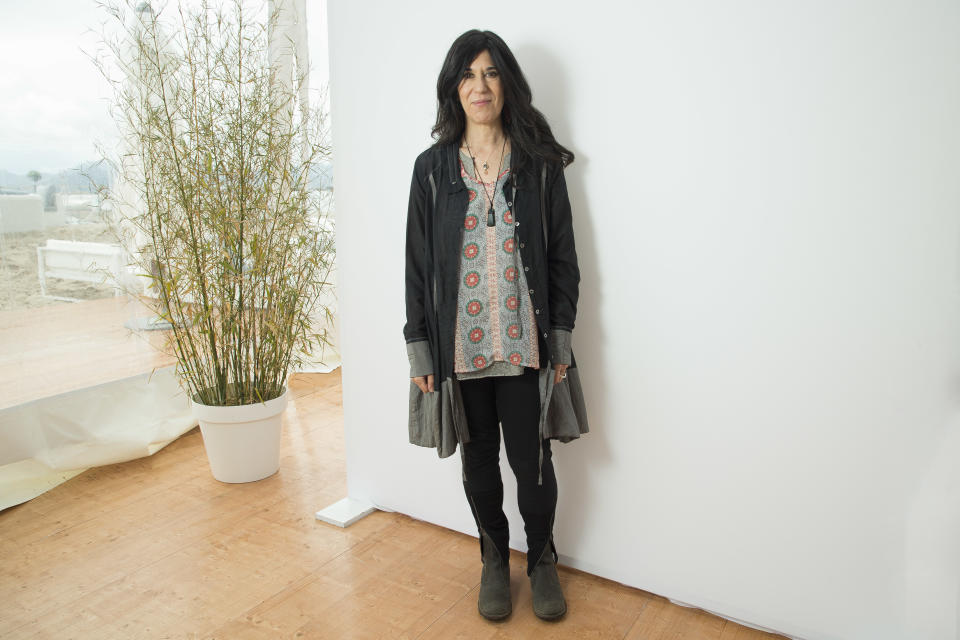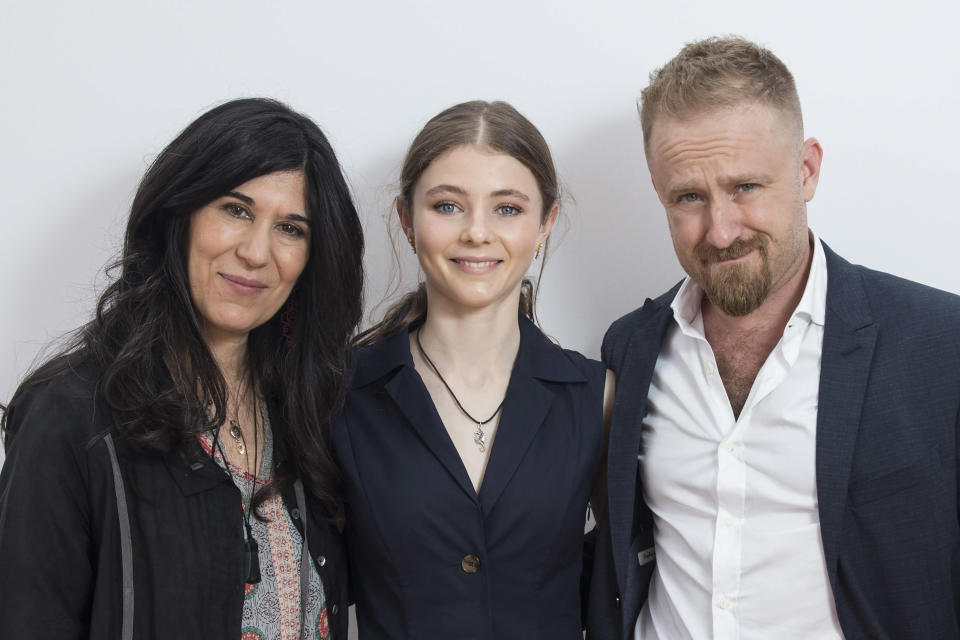The next Jennifer Lawrence? Debra Granik has a new breakthrough leading lady in 'Leave No Trace'

Debra Granik’s 2004 addiction drama, Down to the Bone, earned raves for then-unknown Vera Farmiga, and the filmmaker’s 2010 sophomore effort, Winter’s Bone, did likewise for Jennifer Lawrence, who (along with co-star John Hawkes) received an Academy Award nomination for her breakthrough work in the Missouri Ozarks-set film. And yet except for 2014’s documentary Stray Dog, Granik has been MIA from the multiplexes for the past eight years — a situation that’s finally changing this Friday, when Leave No Trace debuts in theaters. Based on the novel My Abandonment by Peter Rock (which was inspired by newspaper articles), Granik’s latest is a gorgeous, stripped-down affair about a PTSD-afflicted father (Ben Foster) and his teenage daughter (Thomasin McKenzie) living a secluded, off-the-grid life in the national parks of the Pacific Northwest — an illegal existence that makes them the target of authorities.
It’s a tale about the difficulty of escaping modernity, as well as about the scars of war and the way in which traumas can — and, fundamentally, can’t — be passed down through generations. Granik’s indie is another one of her heartfelt and subtly complex portraits of working class people living on society’s fringe, and of the complicated relationships shared by dads and their daughters. Moreover, the film is an arresting acting showcase for both Foster and charismatic newcomer McKenzie, the latter of whom seems primed to receive the same sort of breakout-star praise that greeted the director’s last two leading ladies. In New York City shortly before Leave No Trace’s premiere, we sat down with Granik to discuss her extended fiction-storytelling hiatus, what draws her to inexperienced actresses, and the corrosive impact streaming services such as Netflix are having on the independent cinema scene.

Yahoo Entertainment: Leave No Trace is your first fictional feature since Winter’s Bone in 2010. What took so long?
Debra Granik: You read lots of scripts, and you need to find one that resonates, and a lot of the subjects that were sent our way were not of particular interest. I got one script that was of interest — it dealt with life after incarceration. We got into full motion on making that, and as we went and did research and some rehearsals, and looked at the script in depth, it turned out it was too reductive in some ways. So we carried that over into a documentary, which we’re trying to finish now; the form was better suited for its nuances.
Then, we got caught up in a similar way with a bunch of themes that really interested me. I didn’t know the red-blue dialogue was going to become so intense back in 2012 and 2013. I got involved in a dialogue with someone in the heartland who was really talking about differences between coastal and inner-country, class issues, aftermath-of-war issues, and that interested me. It felt more like an essay that could be built with real people with their life experiences. Plus, it was available. I didn’t have to ask permission; I didn’t have to hustle and try to pitch and persuade people that the lives of ordinary Americans are interesting or worthwhile. I didn’t have to talk to people who say, “Poor people are downers! Get rid of them!” [laughs] I didn’t have to deal with someone saying “We just don’t see the stakes.”
I got the impression that if I went and pitched stories by saying, “I’d like to kill as many people as possible in my films, and I’d love the crime to be heinous and big, and maybe even have a sadist who in addition to killing people likes to torture them as he kills them,” I would have made a film the day after I finished the last one, honestly! [laughs] Real-life and high-stakes crime is evergreen, but I don’t work in those genres, so it takes a minute to get traction for my projects.
Watch the trailer for Leave No Trace:
People who have an indie hit like Winter’s Bone often move up to studio work. Were the projects you were offered not right, or is smaller-scale filmmaking just the vein you prefer working in?
Yes, the projects were not right and this is the vein I’m more comfortable working in. [laughs] Well-stated.
I also like to introduce lesser-known actors in large roles, and it’s very hard to do that. All the actors in the West Coast industry are lined up with a price tag around their neck. It reminds me of our heritage of putting price tags on people on the auction block — we really haven’t been able to leave that alone, have we, as a national MO? So a lot of the actors I’m attracted to, and would like to give a chance — the ones that don’t turn up in every single film over the course of three years — don’t have that good price tag hanging off of them. Things I might want to set up, and the actors I’d want to choose, you get “Oh, no, I’m sorry.”
Also, it’s very hard to make films by committee. A lot of people chiming in, seeing your notes cc’d to 25 people — that’s hard. How do you get to think your own thoughts or hear your own voice, when you’re hearing, “The film would be better if you did this”? It starts to make you feel very unsure of yourself. So I felt it’s not a good match for the way I like to make films.
Though Ben Foster is an established actor, Leave No Trace is led by a newcomer in Thomasin McKenzie. Is it tougher to get an indie produced when you’re working with unknown leads.
It’s very hard, because you need to have investors who are either patient or have one foot in finance, and the other in arts funding. People who think their money is also well spent even if the movie can’t make them whole, so long as it added to the year’s diversity in American cinema. Or maybe it tackled a subject that was worthwhile or introduced a new actor. They’re viewing their money as well spent if it’s contributing to a national endowment of American cinema, because we don’t have state funding in that sense. Or they’re OK with a slow return on a small film that doesn’t please everyone, and that can make them whole but doesn’t require a star because it’s not made for so much. Those investors are brave, and few and far between, and I applaud them. I think they are cultural heroes, because nobody has to use their money that way, and they’re choosing to. That’s exciting.
Of course, it’s a very slow process finding them [laughs]. They’re statistically not so prevalent.
How did you find Thomasin McKenzie?
She was looking for projects, and her reps contacted the casting directors that we love to work with — Paul Schnee, who’s out of New York and works with Kerry Barden. They cast lots of independent films, and are a real friend to the independent film community, because they work in very creative ways and make themselves very accessible. Once that message got to us, [McKenzie] self-taped an audition, which I liked very much. I thought it was out of range to have someone from New Zealand — I was worried about the accent, and issues like that made her seem like not such a good choice. Why aren’t we finding someone locally, you know? But her audition really stuck with me, and Skype conversations ensued, and I loved the way she read the novel, and I liked the discussions she wanted to have. I just thought she was generous of spirit, and was a person who will go far in our collaboration. And she was very willing.
What is it about less-experienced actors that so appeals to you?
This specific role dealt with a teenager who was not enmeshed in social media and hyperconnectivity, so it was very important to look for someone a little bit outside of being caught up in New York or L.A., and who wasn’t immersed in celebrity culture. I was curious about someone who wasn’t yet practicing that on a wide scale. I mean, she had an iPhone; it wasn’t like she was coming out of the woods. Thomasin is living a very normal teen life in New Zealand; I don’t want to make up a legend about that. But she hadn’t been overexposed to a lot of work in which some of the ambiance closes in on you, and that was going to be very important for this role.
I like people that don’t come with a lot of baggage — about how they performed on the last film, or how people see them. I think one thing that’s always a concern to me is you see a role and you’re not seeing the character; you’re seeing so-and-so do it. Then I’m taken out of the story considerably, personally.
What was it about the story that particularly gripped you?
I loved that he lives undetected for so long. That really jazzed my imagination. I was like, “How do people do that? What did it take?” It’s a certain kind of intelligence and conscientiousness and discipline, and it’s arduous. I am very attracted and intrigued by the lives of nonconforming Americans. I was curious how this family was functioning outside of the very subsuming talons of digital society, which feels like it hovers over all of us. I thought, well, a couple of people manage to keep their hedge of protection around them. It took ensconcing in a forest — that’s a big hedge of protection! [laughs]. They filled me with a sense of wonder about what it takes to be different, what it takes to deviate, even a couple of feet.

They’re not very far from Portland, and they still get their food at a grocery store — or, at least, are augmenting the odd mushroom that they can find. I really liked that. And I liked thinking, what would happen if they were asked to come back in the fold? What is the fold? What are the pros and cons? It just was a very interactive novel. It made me think about quality of life. I just traipsed around Walden a few weeks ago, and I love being up there, and it brought it home. Americans have always wondered about these things, in a society that was always going to be very attracted to material acquisition and defining our worth through what we own — and I think a lot of us who came from different decades are stricken by how out of control it is right now. The characters are living in opposition to that, or at least, in a way that interrogates that. And I love to put my thoughts there. It was a good place for me to go.
Was another part of Leave No Trace’s appeal that it allowed you to depict people who aren’t normally represented in mainstream cinema?
It was. I think there’s often a big parallel with journalists and assignments. Some are assigned to go to Dallas to look at Big Oil, Big Agriculture, Big Chem, or they might go to 90201 to look at celebrity, the Kardashians, and generation wealth. And then other people say, this is a big country, it’s not just Dallas and 90210 — there are all these other zip codes. I always felt like I was assigned a zip code that I hadn’t been before, and that maybe is quite different than my own lifestyle. I try to gracefully accept my assignment!
Leave No Trace is being released in theaters, but is it tougher in today’s environment — versus when Down to the Bone debuted in 2004 — to get a low-key adult drama such as this distributed and seen in today’s marketplace?
It won’t be such a bloody asphyxiation-snuff-film scenario if some of the big bosses of streaming can sign a nonaggression treaty. They don’t have to extinguish exhibition. They don’t have to. Given who our leader is right now, for the leaders of the media world to act like him, it feels so ruthless. Why? Ted [Sarandos, chief content officer of Netflix], how’s that going to make your life better?
Do you believe streaming services are diminishing the theatrical viability of independent film?
I think they’re very happy if people don’t ever want to come to a theater again. I think they’re very much of the idea that if we flood you more and more, and if we have you on the sofa with long strands of drool, you’ll never need to go to a theater ever again. History has shown that there needs to be some agora, or public spaces, and I think that we already live a lot of our life on a laptop, or even smaller devices that we hold in our hands. Our necks are getting injured from looking down, and the movie screen gives you opportunity to look up, you know? It gives you an opportunity to possibly have a discussion with someone afterwards. If you’re in your home, it’s real hard. You can tweet someone, but that’s hardly going to keep your full sentences intact.
We also have to ask a question: Will we be an OK society, and an OK species, if all our children — yours and mine — can’t sit for a 90-minute story? These are all the things that play in my mind when you ask: Is it harder to get something made? It’s harder to connect with people who want adult dramas if they’re going to be extinguished and the places of exhibition are going to be shuttered.

I assume, therefore, that you were determined to have Leave No Trace play in theaters, versus premiering on a Netflix or Amazon?
No. It wasn’t a sticking point; that wasn’t offered. I could be singing a different tune. I could have been one of the many filmmakers who received the best offer from one of those services and therefore went with it. That wasn’t a sticking point, other than I don’t want it to happen to anyone. It’s not just about me. This is really about projected film — that does matter to me, yes. For documentaries, I think streaming plays an amazing role, but it’s a problem when the one service you initially relied on to have an incredible buffet — “Come and see a lot of world cinema, and the lives of ordinary people as well” — all of a sudden is narrowed down, until it’s just gladiator after gladiator, and bloodlust. The mono-diet. In fact, I probably have to go home and discontinue my service because I don’t think there’s anything left. The algorithm doesn’t include me, for whatever reason.
How do you, and we, combat that?
To fix the problem, the solution is to go out. Just one day a month, go out and buy a ticket. Go to the movies. Make a commitment to it.
Leave No Trace is in theaters.
Read more from Yahoo Entertainment:

